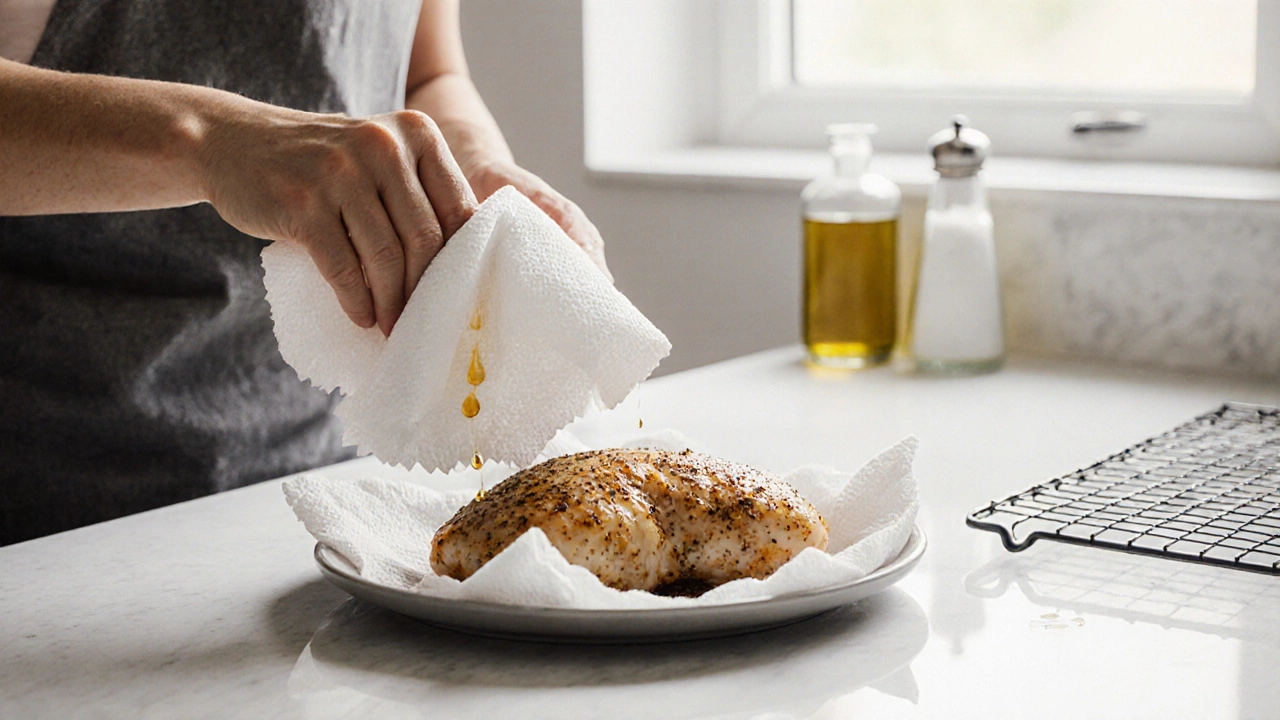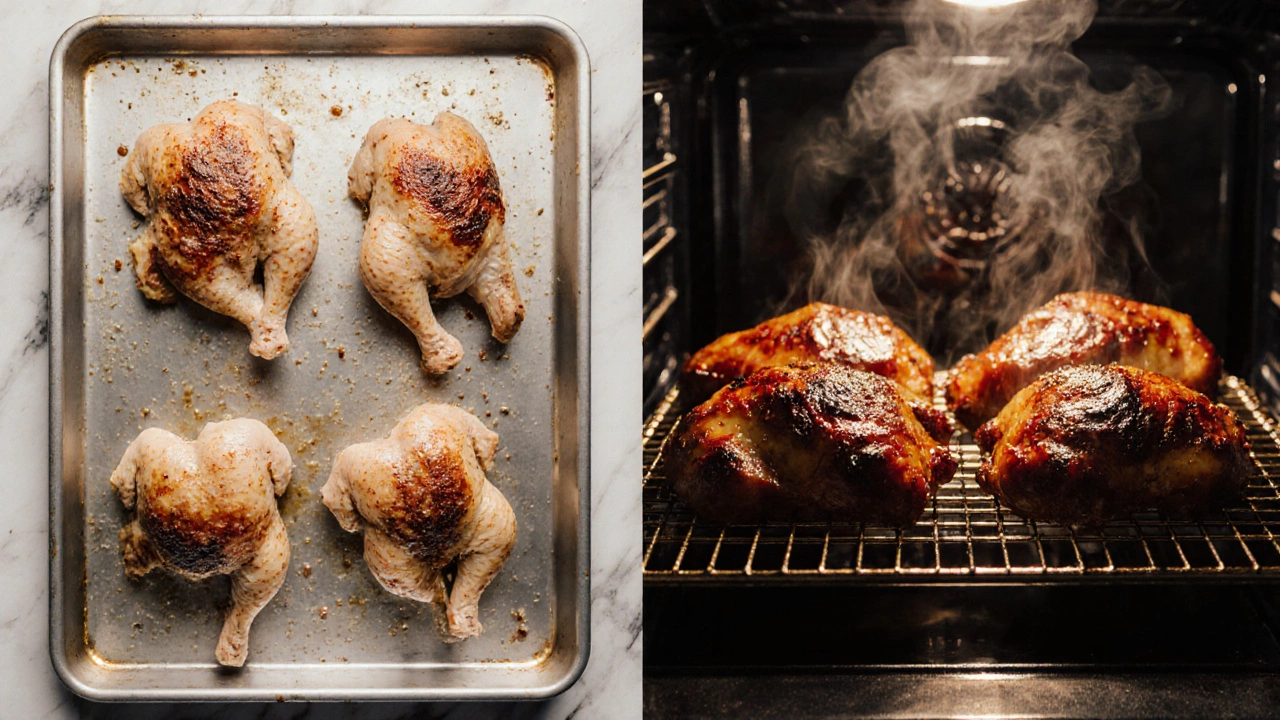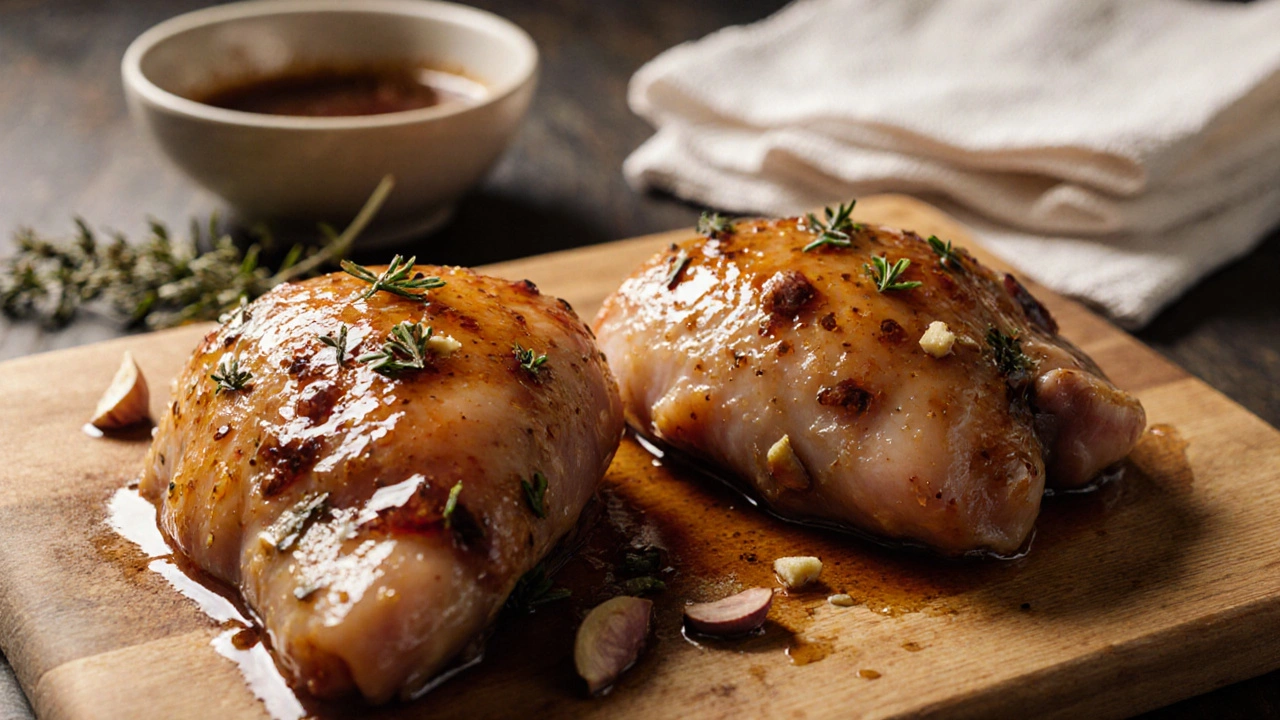Marinade Safety Checker
Is Your Marinade Safe to Bake?
Based on CDC/USDA guidelines and food safety research, this tool helps you determine the right approach for your marinated chicken. Never rinse raw chicken—it spreads harmful bacteria.
You’ve spent time mixing up a flavorful marinade-soy, garlic, honey, maybe a splash of lime-and you’ve let your chicken soak in it for hours. Now, as you pull it out of the fridge, you pause. Should you rinse it off before baking? It’s a simple question, but the answer isn’t what most people think. And skipping this step could be the difference between juicy, caramelized chicken and a soggy, bland mess.
Why People Think They Should Rinse
A lot of folks rinse marinated chicken because they’re worried about two things: excess salt or sugar burning in the oven, and the idea that raw chicken juices are dirty. They imagine the marinade is a sticky, messy coating that’ll turn into a charred, bitter crust. Or worse-they think rinsing makes the chicken safer to eat. But here’s the truth: rinsing raw chicken doesn’t make it safer. In fact, it makes things worse. The CDC and USDA both say you should never rinse raw chicken. Why? Because water splashes bacteria-like salmonella and campylobacter-onto your sink, counter, and even your clothes. You’re not cleaning the chicken. You’re spreading germs. A 2013 study from Drexel University found that rinsing raw poultry increased the risk of cross-contamination by 40%. You’re trading a small mess for a real food safety hazard.What Happens If You Rinse Off the Marinade?
Rinsing washes away the very thing you spent time making. That marinade isn’t just flavor-it’s your secret weapon for moisture and texture. When you rinse, you lose:- The sugars that help create a golden, caramelized crust
- The acids that tenderize the surface
- The oils that keep the chicken juicy during baking
- The herbs and spices that stick to the skin and infuse flavor
What Happens If You Don’t Rinse?
When you bake chicken straight from the marinade, you get something better: a crust that’s crisp on the outside, tender on the inside. The sugars in the marinade caramelize. The oils help conduct heat evenly. The acids break down proteins just enough to make the meat more tender without turning it mushy. A 2020 test by America’s Test Kitchen compared three batches of chicken: rinsed, patted dry, and left as-is. The group that didn’t rinse or pat dry had the best color, the most flavor, and the juiciest texture. The rinsed batch? Dry, pale, and under-seasoned. The patted-dry batch was good-but the one left untouched was better. The key isn’t rinsing. It’s patting dry.
How to Handle Marinated Chicken the Right Way
You don’t need to rinse. You don’t need to scrub. You just need one simple step: pat the chicken dry with paper towels. Here’s how to do it right:- Take the chicken out of the marinade. Let the excess drip off for 30 seconds.
- Place it on a clean plate lined with paper towels.
- Gently press another towel on top. Don’t rub-just press down lightly to absorb surface moisture.
- Let it sit for 5 minutes. This lets the skin dry out slightly, which helps it crisp up in the oven.
What About Sticky or Sugary Marinades?
If your marinade has honey, brown sugar, maple syrup, or molasses, you might worry it’ll burn. That’s valid. But burning doesn’t mean rinsing. It means adjusting your oven. Here’s what to do:- Use a lower oven temperature-375°F instead of 425°F.
- Place the chicken on a wire rack set over a baking sheet. This lets air circulate and prevents the bottom from sitting in sugary liquid.
- Baste halfway through baking. Brush the extra marinade (that’s still in the bowl) over the chicken. Don’t use the same bowl that held raw chicken-pour it into a clean cup first.
- Watch the last 10 minutes. If the surface starts to darken too fast, tent it loosely with foil.

What If the Marinade Is Too Salty?
Some marinades-especially store-bought ones or Asian-style blends-can be salty. If you’re worried, don’t rinse. Instead:- Use less marinade next time. You don’t need to cover the chicken completely. A few tablespoons per pound is enough.
- Marinate for less time. Chicken doesn’t need 12 hours. Two to four hours is plenty for flavor to penetrate.
- Balance salt with acid. Add a splash of lemon juice or vinegar to your next batch to cut the saltiness.
Real-Life Example: My Failed Rinsed Chicken
Last winter, I tried rinsing my teriyaki-marinated chicken thighs because I thought the sauce would burn. I patted them dry, baked them at 400°F, and got a pale, dry result. The sauce flavor? Barely there. My family asked if I’d forgotten to season it. The next week, I skipped rinsing. I patted them dry, baked them at 375°F on a rack, and glazed them with the leftover marinade. The skin was sticky and caramelized. The meat was juicy. Everyone asked for the recipe. The only difference? One step I didn’t do.Bottom Line: Don’t Rinse. Pat Dry. Bake.
Rinsing marinated chicken is a myth. It doesn’t improve safety. It doesn’t improve flavor. It doesn’t prevent burning. It just removes the seasoning you worked hard to apply. Do this instead:- Never rinse raw chicken-ever.
- Pat it dry with paper towels before baking.
- Use a wire rack to keep it elevated.
- Control oven heat for sugary marinades.
- Use fresh marinade for basting, not the raw one.
Is it safe to bake chicken with marinade still on it?
Yes, it’s not only safe-it’s recommended. The marinade is part of the cooking process. Baking kills any bacteria on the surface, and the flavor stays locked in. Just make sure the chicken reaches an internal temperature of 165°F. Use a meat thermometer to check.
Can I reuse the marinade after it’s been on raw chicken?
No, not directly. Once the marinade has touched raw chicken, it’s contaminated. But you can boil it for at least one minute to kill bacteria, then use it as a sauce. Or better yet-set aside a portion of fresh marinade before adding the chicken, and use that for basting or serving.
How long should I marinate chicken before baking?
For best results, marinate chicken for 2 to 4 hours. Chicken breasts can get mushy if left too long-over 8 hours. Thighs and drumsticks can handle up to 12 hours. Overnight isn’t necessary and won’t make it more flavorful. The marinade works on the surface, not deep inside.
Why does my baked chicken sometimes come out soggy?
Sogginess usually comes from not drying the chicken before baking. Excess moisture turns to steam in the oven, preventing browning and crispness. Always pat the chicken dry with paper towels after removing it from the marinade. Also, bake it on a wire rack so air can circulate underneath.
Should I use oil in my chicken marinade?
Yes. Oil helps carry fat-soluble flavors like garlic, paprika, and herbs into the meat. It also keeps the chicken moist during baking and helps the skin crisp up. Use olive oil, avocado oil, or even sesame oil depending on the flavor you want. About 2 tablespoons per pound of chicken is plenty.

